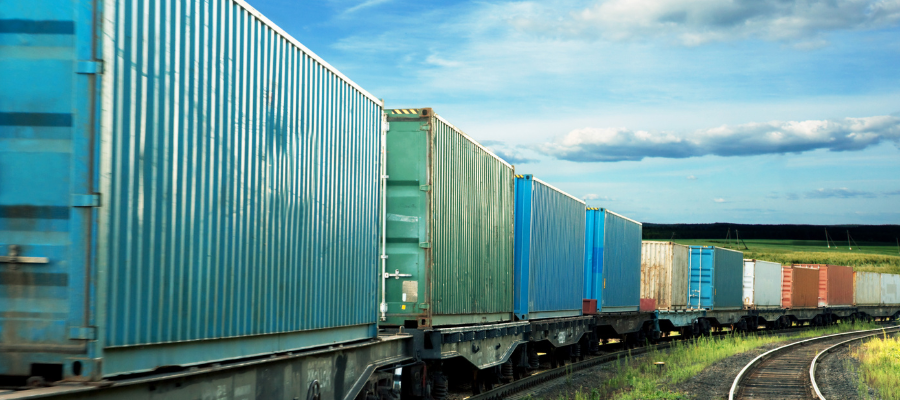🕒 Article read time: 2 minutes
Keeping rail decarbonisation on track

As the government’s deadline to achieve net zero by 2050 edges closer, the need to decarbonise logistics – now one of the UK’s highest-emitting sectors – becomes ever more pressing.
A modal shift away from road and towards rail is widely recognised by Logistics UK members, the government and the rail industry as an essential step towards decarbonising the UK’s supply chain.
RAIL = LESS CARBON AND FEWER EMISSIONS
A tonne of freight transported by rail is estimated to produce 76% fewer carbon emissions than that carried by road, meaning that rail is leading the way as an energy efficient mode of freight transportation. By carrying the equivalent of 110 lorry loads in large quantities of containerised and bulk goods such as aggregates, cement and electronics, rail freight is already reducing the need for a staggering seven million lorry journeys each year, resulting in saving around 1.4 million tonnes of CO2 in emissions per annum. Rail provides significant economic, environmental and social benefits across the country too, including time, cost savings and reliability. As rail provides cost-efficient transport for commercial freight loads, the consumer also benefits through lower prices for manufacturing too.
ZERO-CARBON SERVICE BETWEEN SCOTLAND AND ENGLAND
As previously reported in Logistics Magazine, Varamis Rail collaborated with Network Rail to launch an innovative ‘zero-carbon’ – electric – freight service in January 2023, between Scotland and the Midlands. This came as a response to a high increase in online shopping and home deliveries across the UK, which in turn increased demand for a more environmentally friendly alternative to road haulage. This service will transport consumer goods using fully electric four-car trains converted for freight purposes and is targeted at express parcels and third-party delivery companies.
HYDROGEN-READY RAIL SERVICE
There have been promising breakthroughs in the use of hydrogen for rail, which is increasingly seen as a key to decarbonisation, as it pushes forward as an alternative for powering locomotives. It is supported by projects such as HydroFLEX, which has been funded by the Department for Transport (DfT) and is the UK’s first hydrogen-ready passenger train, powered by hydrogen made using renewable energy sources. Unlike diesel trains, hydrogen-powered trains do not emit harmful gases, and instead use hydrogen and oxygen to produce electricity, water and heat. This technology will enable the industry to retrofit current in-service trains to hydrogen, helping to decarbonise the rail network and make rail journeys greener and more efficient.
ELECTRIFICATION ENHANCES PERFORMANCE
Electrification also offers another promising solution in that it not only reduces carbon emissions, it also enhances performance, reduces journey times and improves air quality. In contrast to other forms of transportation, where decarbonisation necessitates the creation of radically new power sources and systems, electrified rail transport is a fully developed, tested green technology that has been in operation for more than 60 years. By electrifying small sections of the rail network, it would enable rail freight to move away from diesel traction. Electric trains may run nearly carbon-free over greater distances without range restrictions when powered by renewable or nuclear energy delivered by overhead catenary (or a third rail).
EIGHT HUNDRED EXTRA ELECTRIFIED MILES REQUIRED
It is estimated that only approximately 800 miles of electrification is needed to allow around 95% of rail freight to be electronically hauled, according to the Chartered Institute of Logistics and Transport (CILT) electrification strategy research. As it stands, however, only about 10% of freight trains in the UK are hauled by electric locomotives. A reason for this is because the infrastructure needed for wide-scale electrification to be implemented is not yet in place. The industry needs commitment from government so that it can support rail freight growth and allow both freight and passenger trains to run more efficiently. Logistics UK is urging the government to commit to a long-term programme of electrification to enable the railway to decarbonise. Such a commitment would help to create greater capacity across the rail freight sector and support investment in new rolling stock and research into new technologies.
INTEGRAL TO THE UK ECONOMY
Rail freight is an indispensable part of the British economy, and an essential component in supporting economic recovery following the pandemic and long-term sustainable growth. It contributes to the national – and local – economy, with £2.45 billion being contributed to the UK economy each year as reported by Network Rail. Furthermore, rail provides efficient routes to markets and better connectivity to ports, allowing businesses access around the world while also importing goods and materials reliably and securely. However, as customers look to make the modal shift to rail there must be capacity on the rail network to accommodate this growth and costs need to be kept low to remain competitive.
“Rail freight brings significant value for areas in the north of England, Scotland and Wales – where the railway has some of its busiest sections and is home to the headquarters of many freight operators,” said Ellis Shelton, Policy Advisor, Logistics UK, “All future regulatory and contractual framework must enable continued private sector investment but also support programmes such as the Mode Shift Revenue Support (MSRS) scheme which supports freight customers in moving their goods by rail.”
*www.logistics.org.uk/rail
Published On: 16/03/2023 16:00:26

Comments Section
If you are a Logistics UK member login to add comments.